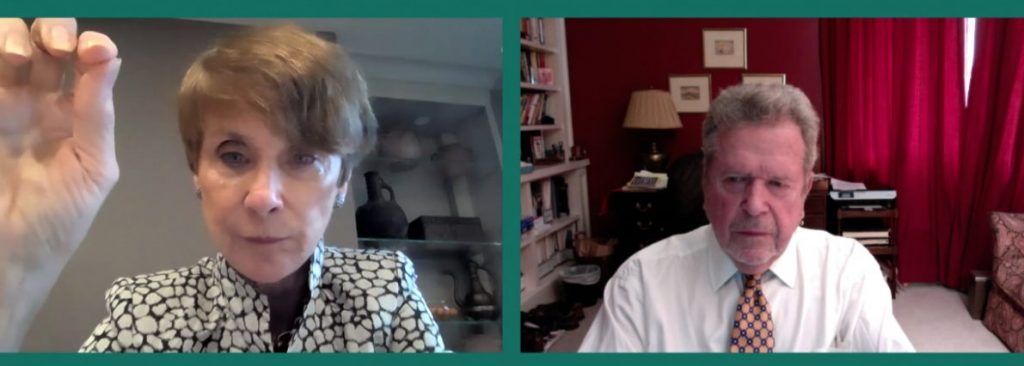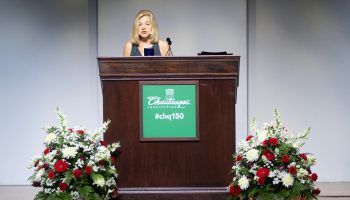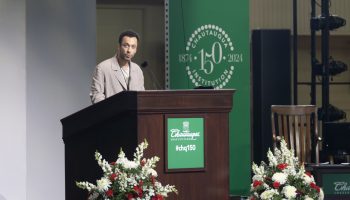
Barbara Bodine started her Chautauqua lecture with a story that has spread throughout the Middle East. The King of Saudi Arabia was reluctant to let Americans search for oil, but relented — and on the seventh try, the oil was found. The king was clearly disappointed: “I was hoping that you would find water. My people can’t drink oil.”
Bodine, former U.S. Ambassador to the Republic of Yemen and currently the Distinguished Professor in the Practice of Diplomacy and concurrent Director of the Institute for the Study of Diplomacy at Georgetown University, spoke with Geoffrey Kemp, senior director of Regional Security Programs at the Center for the National Interest, on Friday, July 3, on the CHQ Assembly Video Platform. Their lecture on “The Geopolitics of Climate Change and the Environment” was the final presentation in Week One’s theme of “Climate Change: Prioritizing Our Global and Local Response,” and the year’s Middle East Update program.
Kemp shared three important issues to give the audience context to climate change in the Middle East: drought and higher population in Egypt, rising sea levels in the Mediterranean, and the Syrian Civil War.
Because of droughts, the water supplies that feed the Nile River are decreasing, and the demand for water in Egypt and its neighbors to the south, like Ethiopia, are growing. Ethiopia is also building an enormous dam, and Egyptians have said that if water to their country is cut by any significant amount, conflict will occur.
The second problem Kemp detailed was how rising sea levels in the Mediterranean are affecting agriculture. The salt water makes farming very difficult, and the rising waters are approaching the mouth of the Nile, where much food is grown. The only solution is to invest heavily in new agricultural methods and in desalination plants to remove the salt.
The Syrian Civil War was the last issue and the most dangerous, according to Kemp. Before the war, an intense drought forced many farmers to move into cities. When the war came, most of them were ready to join the rebels. The ongoing result of the civil war is the refugee crisis in neighboring countries and in Europe.
Bodine began her part of the lecture by talking about how the world still sees Saudi Arabia and other Gulf countries “through the prism of our insatiable need for oil.”
Bodine said that need led to President Jimmy Carter announcing that the Persian Gulf region was a vital interest to the United States which would be defended by all means necessary, and drove the U.S.’s decision to protect and liberate Kuwait in the ‘90s, and “was part of our reason for going into Iraq in the 2000s.”
“For us, energy security — our energy security, our friends’, our allies’, our trading partners’ — has always rested on the free flow of oil from the Gulf through the Strait of Hormuz and ever onward,” Bodine said.
Shifting from oil to water, Bodine said that within the Arabrian Peninsula there are no rivers, not even a creek, and temperatures in the summer consistently reach over 120 degrees Fahrenheit with no tree cover.
“Water is seen as a gift from God, which brings all life — and the loss of water, simply means death. Once upon a time, very few people dared to live in this environment, and life was sustained by the miracle of water. (Water) was held in common. It is owned by no one. And it is neither to be hoarded nor squandered,” Bodine said.
Oil changed that equation, because there was energy to create and purchase drinking water, according to Bodine.
She said that these countries are aware that climate change is a direct threat and are taking steps. For example, the United Arab Emirates are leading a project to make a carbon-neutral city.
One of their neighboring countries, Yemen, has a different story.
“There’s a story in Yemen that when God created the peninsula, he tipped in one direction, and all the oil flowed to the east, and then he tipped it the other direction, and all the people flowed into Yemen,” Bodine said.
While the country has no significant oil reserves, it does lack surface water, like other Gulf countries. Other societal issues abound: The average income is $2 a day and Yemen has been at war for five years. In 1975, Yemen had the highest fertility rate in the world at 8.7 children per woman.
“Usually when I say that in front of a live audience, every woman … in the audience just cringes,” Bodine said.
Currently, the fertility rate is at 3.9%, and from 1980 to 2005, the population tripled. Bodine said that a child dies every 12 minutes in Yemen. Due to all these factors, the country is ranked as one of the most vulnerable — and least able to adapt to the changing climate — in the world.
Another country that has been struggling with water security is Iraq. The country is located between the Tigress and Euphrates Rivers and used to be very fertile. Due to poor water management, decades of war and Turkish-built dams reducing the amount of water flowing into Iraq, Bodine said that it will take generations of investment to build the country back to what it was.
The lecture then shifted to the Q-and-A session between Bodine, Kemp and Geof Follansbee, vice president of advancement and CEO of the Chautauqua Foundation. The first question was about what implications climate change in the Middle East have on the rest of the world.
Bodine said with the conventional view of Gulf countries as oil producers, the disruptions from climate change mean that oil is harder to produce and export. Another key element is that in these countries, food and water security is the basis of society. A friend explained to Bodine that in the past, a leader’s most important job was to get the tribe from one oasis to another. When food and water are not secure, the social contract begins to fray, as do political structures.
“Whether or not this would end up in a Syria-like civil war, I don’t know. Could it end up in a mass migration? Where at some point there is just (the idea of) ‘We can’t live here anymore’?” Bodine asked.
Kemp then talked about climate change disruptions in Iran and security threats to the United States. Iran is the largest country in the Middle East and has had terrible droughts and instability brought on by climate change, according to Kemp. Iran also has a political rivalry with Saudi Arabia over control of the Persian Gulf and shipping of oil and food.
There is good news, however, and according to Kemp it is twofold: cooperation and technological advancements. Relationships between Israel and its neighbors are fragile, but there has been relative peace for 20 years. Israel has been able to work with Jordan and has been providing water to the country through the Red Sea-Dead Sea project.Israel has also been able to better preserve water, diversify their agriculture and improve their management of water resources.
The final question was about the link between progress on climate change and overall Middle East peace work, particularly efforts that involve the United States.
Kemp and Bodine said that they are separate issues. Bodine said that the current U.S administration has not helped in putting together a comprehensive overview of climate change or Middle East peace, particularly exiting the Paris Agreement. Since the European Union is next door to the Middle East, they will be the ones seeing the most migrants.
“(The E.U. has) a huge interest in working together with the Middle East countries on all these long-term sources of conflict which lead to migration,” Kemp said. “So, at this point, the United States can be a cheerleader. … The hope would be that Europeans could take the lead on this.”




